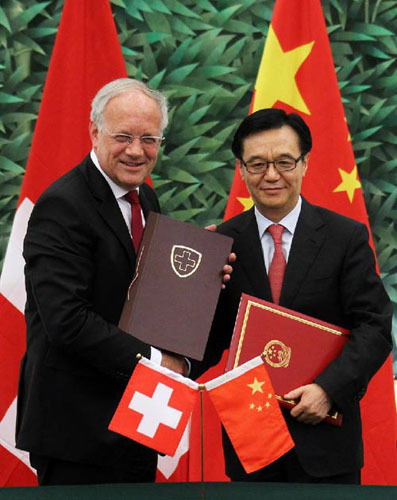Switzerland And China Advocate For Tariff Dialogue

Table of Contents
Switzerland's Role in Promoting Tariff Dialogue
Switzerland's Trade Policy and its Emphasis on Free Trade
Switzerland has a long-standing commitment to free trade and multilateral trading systems. Its robust economy is heavily reliant on international commerce, making it a staunch advocate for reducing trade barriers. Switzerland’s success stems from a pragmatic approach to trade negotiations, emphasizing mutually beneficial agreements.
- Successful Trade Negotiations: Switzerland has successfully negotiated numerous bilateral and multilateral free trade agreements (FTAs) demonstrating its expertise in navigating complex tariff negotiations. Examples include its agreements with the European Union, China, and numerous other countries.
- Active Participation in International Organizations: Switzerland is an active member of the World Trade Organization (WTO), actively participating in its various committees and dispute settlement mechanisms. Its involvement extends to other international trade organizations, reflecting its dedication to a rules-based global trading system.
- Economic Dependence on International Trade: Switzerland's economy is highly dependent on exports, making the reduction of tariffs a crucial factor in its economic prosperity. This economic reality directly motivates its advocacy for open dialogue and cooperation on tariff policies.
Specific Initiatives by Switzerland to Foster Tariff Discussions
The Swiss government actively engages in diplomatic efforts to promote tariff reduction and constructive dialogue. While specific initiatives are often confidential during negotiations, Switzerland consistently champions the multilateral approach within the WTO framework.
- Diplomatic Efforts: Switzerland engages in bilateral and multilateral diplomatic efforts to encourage tariff reductions and address trade disputes peacefully. This includes actively participating in WTO negotiations and working with other nations to find mutually acceptable solutions.
- Joint Declarations: Switzerland frequently participates in joint declarations and statements with other nations advocating for fair and transparent tariff policies. These declarations often emphasize the importance of dialogue and cooperation in resolving tariff-related disputes.
- Strategic Reasoning: Switzerland's strategic reasoning for advocating tariff dialogue is rooted in its belief that reduced trade barriers lead to economic growth, increased consumer choice, and overall global prosperity.
China's Position on Tariff Negotiations and Dialogue
China's Trade Relations and the Importance of Global Cooperation
China's increasingly prominent role in global trade necessitates its engagement in constructive dialogue regarding tariffs. Its growing economic influence compels a commitment to fostering a stable and predictable international trading environment.
- Participation in Trade Agreements: China actively participates in various international trade agreements and organizations, reflecting its growing commitment to international cooperation on trade issues. Its engagement in the WTO exemplifies this commitment.
- Benefits of Reduced Tariffs: Reduced tariffs offer significant benefits to China, facilitating access to global markets for its exports and potentially lowering the cost of imported goods for its consumers.
- Belt and Road Initiative: China's Belt and Road Initiative (BRI) aims to improve connectivity and infrastructure across Eurasia, fostering increased trade and economic cooperation. This initiative underscores China's recognition of the significance of global trade flows.
China's Stance on Specific Tariff Issues and its Approach to Negotiations
China's position on specific tariff issues is complex and evolves as its economic interests and geopolitical relationships change. However, there is a growing acknowledgment of the need for dialogue and cooperation in resolving trade disputes.
- Tariff Disputes: While China has been involved in various tariff disputes, its approach increasingly reflects a willingness to engage in negotiation and seek mutually beneficial solutions.
- Official Statements: Recent statements by Chinese officials often emphasize the importance of multilateralism and cooperation in addressing trade imbalances and tariff issues.
- Aligning Approaches: Aligning the approaches of China and Switzerland presents opportunities to leverage their combined influence in promoting fair and transparent global trade policies. However, challenges remain, particularly in addressing differing national priorities and interpretations of international trade rules.
The Synergistic Effect of Switzerland and China's Joint Advocacy
Combined Influence on Global Trade Policies
The combined influence of Switzerland and China on global trade policies is significant. Their joint advocacy for tariff dialogue can create a powerful impetus for change within international forums.
- Economic Weight and Diplomatic Power: Switzerland's expertise in negotiating trade agreements combined with China's economic heft provides a strong foundation for promoting tariff dialogue.
- Positive Change: Their joint influence could lead to more constructive engagement in resolving tariff disputes, fostering greater transparency in trade policies, and promoting a rules-based multilateral trading system.
Potential Benefits of Increased Tariff Dialogue
Increased dialogue on tariff policies between nations holds immense potential for positive outcomes.
- Increased Trade: Reduced tariffs facilitate increased trade flows, benefiting both developed and developing countries.
- Reduced Trade Tensions: Open communication and negotiation help prevent the escalation of trade disputes, contributing to a more stable global trading environment.
- Economic Growth: Freer trade fosters economic growth by increasing competition, innovation, and efficiency. Reduced tariffs enhance market access for businesses, spurring job creation and economic expansion.
Conclusion: The Importance of Continued Tariff Dialogue Between Switzerland and China
The joint advocacy of Switzerland and China for tariff dialogue is crucial for fostering global trade stability. Their combined influence has the potential to significantly impact global trade policies, leading to reduced trade tensions, increased economic growth, and a more equitable international trading system. The potential benefits of increased cooperation on tariff policies are substantial, promising a more prosperous and interconnected global economy. Follow the ongoing dialogue on Switzerland and China's tariff negotiations to stay informed about these crucial developments shaping the future of global trade. Learn more about the importance of tariff dialogue for global trade and stay updated on the latest developments in Switzerland and China's advocacy for constructive tariff policies.

Featured Posts
-
 Combatiendo Enfermedades Cronicas Un Superalimento Superior Al Arandano
May 21, 2025
Combatiendo Enfermedades Cronicas Un Superalimento Superior Al Arandano
May 21, 2025 -
 Mulhouse Le Noumatrouff Recoit Le Hellfest
May 21, 2025
Mulhouse Le Noumatrouff Recoit Le Hellfest
May 21, 2025 -
 France Sky Mystery Investigation Into Recent Red Light Sightings
May 21, 2025
France Sky Mystery Investigation Into Recent Red Light Sightings
May 21, 2025 -
 Provence Walking Trails A Self Guided Journey From Mountains To Mediterranean
May 21, 2025
Provence Walking Trails A Self Guided Journey From Mountains To Mediterranean
May 21, 2025 -
 Out Now Premier League 2024 25 Champions Image Gallery
May 21, 2025
Out Now Premier League 2024 25 Champions Image Gallery
May 21, 2025
